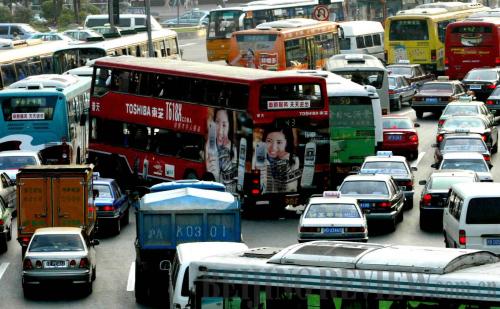|
 |
|
TRAFFIC HEADACHE: A congested road in Shanghai during rush hour. Time- and energy-consuming traffic is considered a major hindrance to Chinese cities' modernization processes (XINHUA) |
Costly Commute
Among China's cities, Beijing residents spend the longest time traveling to work each day, says the China New Urbanization Report 2010 from the Chinese Academy of Sciences.
The average commute time for Beijing residents is 52 minutes, followed by Guangzhou's 48 and Shanghai's 47.
Some people may argue an economically developed city surely has a large number of motor vehicles and crowded traffic situations while in underdeveloped cities, traffic will naturally take less time.
Hong Kong's economic development level is similar to Shanghai's, but its traffic runs much more smoothly than Shanghai. The major reason is the number of licensed motor vehicles in Hong Kong is limited to 600,000, one seventh of Beijing's and one sixth of Shanghai's.
Dense traffic is not necessarily a result of economic boom. The key is the city's attitude toward traffic jams and motor vehicles. Many cities regard the automaking industry as the pillar of their economies. As a result, as the economic growth rate rises, their streets also become more choked by cars. Developing more public traffic for residents, thereby reducing the use of private cars is the practice of many large cities all over the world.
This ranking list reminds cities to do more to improve their urban traffic flows. If residents can spend less time in transit, their sense of happiness will surely rise.
Workers' Daily
Failure of Judiciary
In response to forced land acquisition and relocation, a farmer in Wuhan, central China's Hubei Province, built a cannon tower on his farmland and twice repelled the eviction team.
Seeing this piece of news, we can't help asking: Where is the law? Who are responsible for protecting rural residents' legitimate rights? Isn't it a tragedy for them to have to protect their rights by using homemade cannons? News of this kind shames the country's judicial system.
Sometimes, the government and people have conflicting interests. Especially in the process of land acquisition, local government interests tend to be interwoven with businesses'. In these cases, without support from legal or public opinion, local residents' interests are easily sacrificed. When the law chooses to keep silent in face of unfairness and injustice, violent struggle becomes a choice for the underrepresented.
To safeguard fairness and justice, the judicial system must play a big role. If it is played well, we won't have a farmer building a cannon tower to protect his legitimate interests.
The Beijing News
Cheaper Not Always Better
Taiwan-based world's largest contract manufacturer of electronics Foxconn has announced it will raise the wages of its employees on the Chinese mainland by a large margin, after a series of employee suicides due to its allegedly poor working and living conditions. Japanese automaker Honda has also taken similar moves after workers in its Chinese plants staged strike and asked for pay rises.
Foxconn and Honda's decisions will inevitably drive up workers' wages in labor-intensive industries. Meanwhile, there are fears pay rises will probably deprive China of the advantage of low labor costs and a number of businesses may move to other countries.
In recent years, China has attracted many foreign investors thanks to its cheap labor force. But some investors, who are familiar with China's national conditions and laws, are good at playing edge balls to deal with the government's minimum wage standards. They neither touch the red line, nor offer to raise employees' wages, so that they can save costs at the maximum level.
It's too early to judge whether China's labor-intensive industries will be still internationally competitive with rising labor costs. But given the overall low wage levels around the country, if the cost advantage is based on the sacrifice of workers' interests, it's one we should kick into touch.
Yanzhao Evening News
Damage or Cure?
Recently, 14 children being treated at an Internet addict rehabilitation camp in east China's Huaian in Jiangsu Province escaped from the facility at night by tying up their supervisor and stealing his keys. They told the police they could no longer bear the harsh life in the camp.
There are many institutions claiming to rehabilitate problematic adolescents and Internet-addicted youth. Some of them use physical violence on the inmates. The rehabilitation camp in Huaian is no exception.
Children have a legitimate right to reject malign education in the process of growing up. It's because their supervisors are adults, who are physically more powerful, that the children dare not fight back violently. They are forced to live in fear and desperation.
When they receive corporal punishment, it's almost impossible for children to solve problems through equal dialogue, negotiation or lawsuits. In this case, the adults must take seriously the fleeing of children from the Internet addict rehabilitation camp in Huaian. More importantly, society needs to ponder these issues and try to improve the situation.
The Beijing News | 